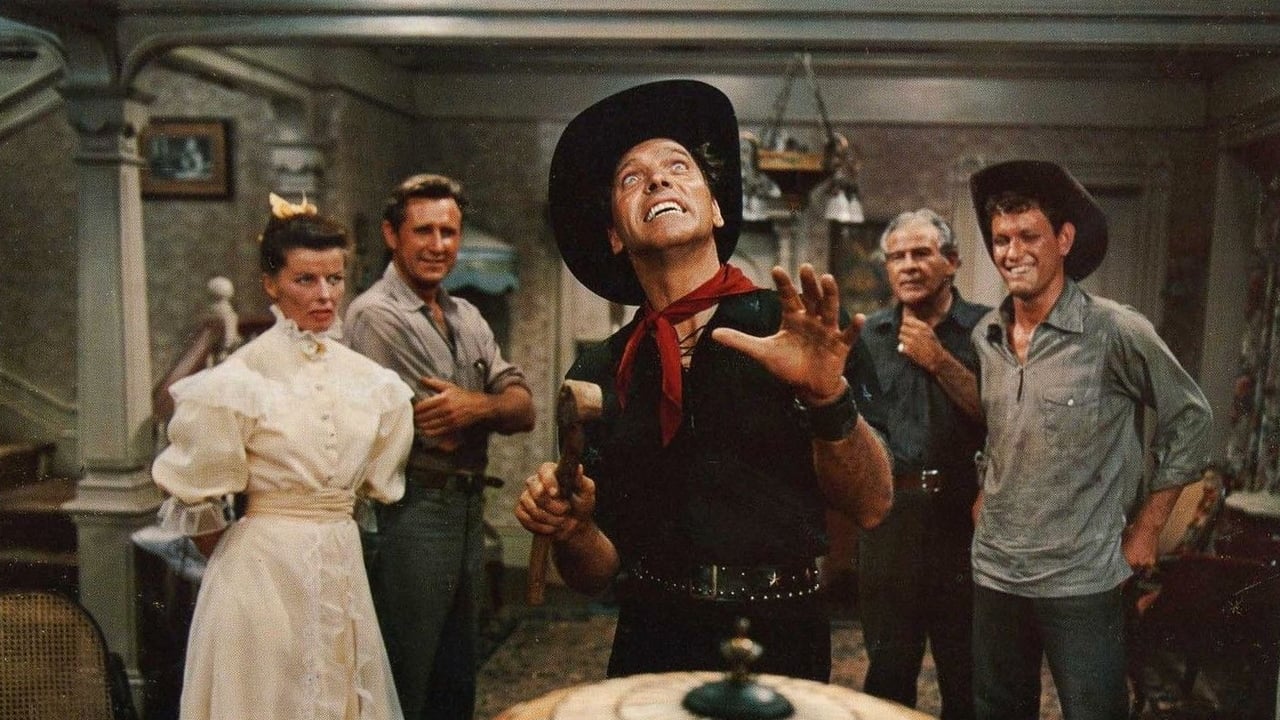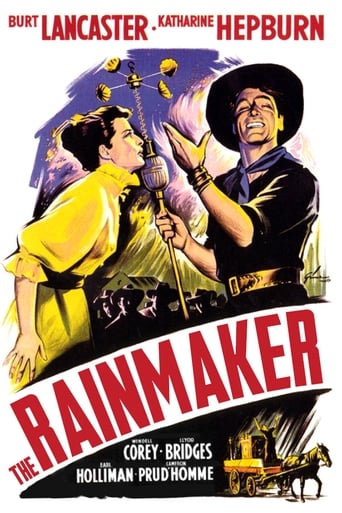

Katharine Hepburn takes the lead in The Rainmaker, in one of her finest performances. She's an old maid living in a small town, keeping house for her father and brothers, Lloyd Bridges, Earl Holliman, and Cameron Prud'Homme. She's secretly got a crush on Sheriff Wallace Ford, but he doesn't pay her any attention. The town is going through an unprecedented drought, and Burt Lancaster, a travelling conman, comes to town claiming to be a "rainmaker". As he tries to convince the town he's genuine, he also convinces old maid Kate that she's beautiful and desirable.While Kate's and Burt's acting really make the movie, the story itself is a classic. It was also adapted to a Broadway musical called 110 in the Shade, by Tom Jones and Harvey Schmidt. The characters are real and vivid, and even though it's obvious it was adapted from a play—written by N. Richard Nash—it's still very enjoyable even for modern audiences. Who doesn't wonder with fear and sadness that they'll never find love, and who doesn't want to believe in that last scrap of hope even when it might be fake? I don't actually like the film, but I appreciate how beloved it is by others. I don't really care for Kate's character and choices, but it wouldn't be fair for me to write a negative review for personal reasons.The film is chalk full of famous moments: romantic, funny, and wise. "When a man makes a point of ignoring you, he ain't ignoring you at all," is one of my favorite lines. And while I won't spoil the ending for you, it is incredibly famous. You might have seen it before in classic film montages. Burt Lancaster's iconic final line, which unfortunately I can't quote here because it would spoil things, is my favorite part of the movie.
... View MoreA Hal Wallis Production. (Available on an excellent Paramount DVD). Copyright 1956 by Hal Wallis Productions. Released through Paramount Pictures. New York opening at the Astor: 12 December 1956. U.S. release: February 1957. U.K. release: 18 March 1957. Australian release: 25 July 1957. Sydney opening at the Prince Edward: 26 July 1957 (despite an enormous publicity blitz, ran only 3 weeks). 10,921 feet. 122 minutes.SYNOPSIS: An engaging confidence man brings back life to a drought- stricken countryside and to a charming but self-deprecating spinster.COMMENT: Paramount's publicity department took enormous pains to conceal the fact that The Rainmaker began life as a television play. Broadcast on CBS "Philco Playhouse" on 16 August 1953, it starred Darren McGavin. Broadway producer Ethel Linder Reiner saw the TV play as a likely stage vehicle for Geraldine Page. Author Nash needed little persuasion to adapt his play for Broadway where it opened at the Cort on 28 October 1954, running a satisfactory 125 performances. McGavin repeated the title role and in addition to Page the cast included Prud'homme (who reprized his part for the film), Richard Coogan and Albert Salmi. The director was the mysterious Joseph Anthony who I believe is the same Joseph Anthony who had a few small parts in Hollywood in the early 1940s. Presumably he then enlisted and when discharged turned to television and stage directing. The Rainmaker is his first film. The Matchmaker, Career, All in a Night's Work, Conquered City followed. A young actress named Yvonne Lime also makes her debut in The Rainmaker, but aside from Untamed Youth in 1957, she was never heard from again."The Rainmaker" is a small play. So how to transfer it to a big screen? Dress it up with VistaVision and Technicolor for a starter. And then? Wisely I believe (though many critics disagreed with me), it was decided to keep most of the "exterior" scenes within the confines of obvious stage sets, so that the viewer often has the impression of watching an actual Broadway play. The interior sets are by contrast highly realistic, but the change doesn't work because there's too much talk and there's nothing else the viewer can look at but the actors. Mind you, a lot of people liked this over-concentration, for Katharine Hepburn was nominated for Hollywood's most prestigious award for Best Actress (losing to Ingrid Bergman's Anastasia). But I found a lot of the dialogue too verbose, too repetitive, too obvious, too pretentious, too over- emphasized.Oddly, neither the often picturesque sets nor the skilfully atmospheric color photography were nominated for awards, though Alex North deservedly received a nod for his music score (losing in the Drama or Comedy category to Around the World in 80 Days).For all its expertise, both in front of and behind the camera, I thought The Rainmaker's whimsical little plot too slight to sustain its appeal over more than two hours. And in my opinion Wendell Corey (although hampered by close-ups of such intensity his facial make-up was obvious) came out of it best.There's a postscript to prove you just can't keep a middling play down. In 1963 author Nash turned it into a Broadway musical called "110 in the Shade". Inga Swenson, Robert Horton, Stephen Douglas and Will Geer starred. So Nash has made a fortune from this one idea, including $350,000 just for the movie rights.OTHER VIEWS: Here is Katharine Hepburn as an introspective spinster who, while still hoping for a husband, has secretly written herself off as a lost cause. Again she finds romance during a heat-baked dusty summer. But there the resemblance to "Summer Madness" ends.The setting this time is not an opulent Venice, but a dreary Western town caught in the throes of a drought. In a ranch on the outskirts of town, two brothers and their father scheme away, trying to marry off the un-wedded housekeeper daughter (Katharine Hepburn)."The Rainmaker" is an excellent piece of theater. It concentrates on six characters, providing meaty opportunities for the two leads and all four support players, makes forceful use of its one set, and keeps a basically simple story fired up within a tight time frame. Another plus is that it's difficult to categorize (a fantasy? a bucolic comedy? a sentimental romance?) and thus can be all things to all theater- goers. On the other hand, the cinema, alas, has a more searching eye than either the stage or television. My personal opinion (certainly borne out by the film's box-office failure in almost every country where "Summer Madness" was a huge success) is that "The Rainmaker" is so down-to-earth, it simply has no bond with the average, entertainment-seeking movie-goer. — JHR writing as George Addison.
... View MoreMy big brother took me to see this film when it first came out. He told me that it was about a con-man. I was waiting and waiting for at least one of the characters to be sent to prison ... conman = convict, get it ? Hey, I was just a kid, gimme a break ! Anyway ... "The Rainmaker" has since become one of my very favorite movies. The play "110 in the Shade" as well. I noticed in some of the other reviews that people expected the characters to burst into song. Well, in 110, they DO ! Katharine Hepburn IS Lizzy and Burt Lancaster IS Starbuck !!! The supporting players all inhabit their roles excellently. I cannot think of any who seems miscast.The story moves along and for me just WORKS! Looking for a good old fashioned romance with a twist ??? Look for and try "The Rainmaker" it's a good 'un !. !
... View MoreReading the DVD sleeve description of "The Rainmaker" certainly opens the door to different interpretations. It says here, "Under the spell of a wandering charlatan named 'Starbuck', a lonely ranch girl blossoms into full womanhood. Katharine Hepburn garnered an 'Oscar' nomination as the 'believably plain yet magnificently beautiful' tomboy rancher, with Burt Lancaster brilliantly cast in the role of the smooth-talking con man who sells his rainmaking 'powers' to unsuspecting, drought-ridden Western towns." Ms. Hepburn is clearly neither a "ranch girl" nor a "tomboy rancher" in the film. My impression was that she was a spinster, with some advanced (for the time) degree of education in her background.Hepburn's "Lizzie" correctly amends her "plain" character as, "plain as plain as old shoes." In progression, Lancaster addresses her as "Lady," then "sister," then "girl." Hepburn's characterization has different timbre than original play; obviously, the actress was taking her age and background into consideration. Hepburn and Lancaster effectively use bits and pieces of their own personalities in the lead roles. It helps that director Joseph Anthony keeps the film theatrical-looking. The camera moves well, and deliberately with the performers. So, you feel like you are watching a stage play. Sets and setting are also permitted to be less realistic. In these ways, the film shows itself to be aware of casting shadows.Another stand-out in the "older" cast is Earl Holliman, who certainly must be playing a teenager, or is endearingly dim-witted? Interestingly, the two performers most arguably too old for their parts received the greatest award recognition - Mr. Holliman with a "Golden Globe" win as the year's "Best Supporting Actor", and Hepburn with her "Academy Award" nomination. Mr. Lancaster was also deservedly praised, and would extend his "Starbuck" to his award-winning "Elmer Gantry" (1960). Wendell Corey, Lloyd Bridges, and Cameron Prud'homme also contribute intriguing performances. Much credit should go to N. Richard Nash, who wrote a story that strikes collective chords in the human consciousness.********* The Rainmaker (12/13/56) Joseph Anthony, N. Richard Nash ~ Katharine Hepburn, Burt Lancaster, Earl Holliman, Wendell Corey
... View More